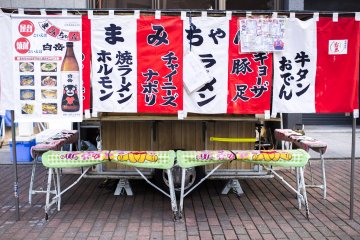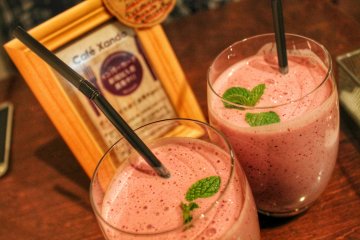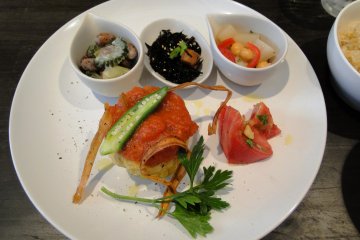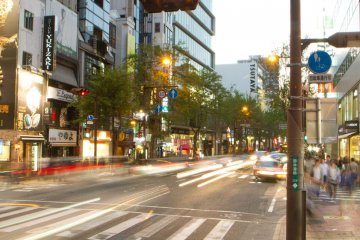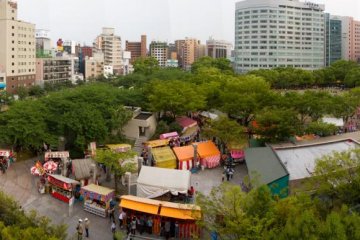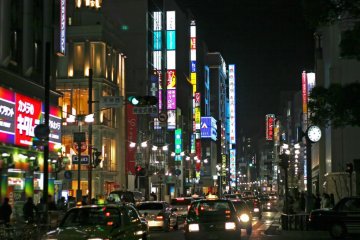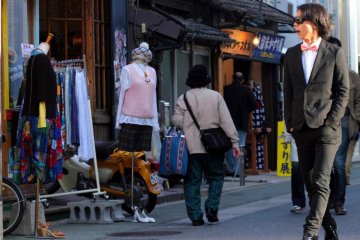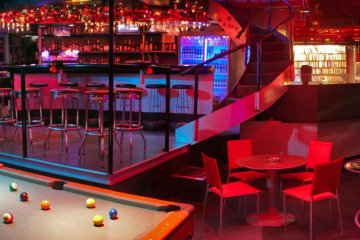Fukuoka may not be as large as Tokyo and Osaka, or dazzling with as many lights, but I've had many more memorable times in Fukuoka's downtown area, Tenjin. Tenjin is located in the Central Ward of Fukuoka City. It's known as the fashion capital of Kyushu and often named a gourmet or retail city. I found it to be more for shopping and experiencing a Japanese city rather than for sightseeing, but still worth the time of any tourist. One thing that's really appealing is that it offers all the shops you need in a smaller and more relaxed location than many of Japan's other large cities.
Before my arrival I was worried that Fukuoka, being a smaller city, would also lack in supply of shops. However, along the main street - Watanabe-dori - I found several major department stores and shopping centers, including IMS, Tenjin Core and the Vivre Building. I'm not a fan of shopping but I've spent hours in the underground shopping arcade - Tenjin Chikagai - located underneath Watanabe-dori. 150 shops and restaurants run along a 19th century European style road, and it can be quite a pleasant walk. Towards the west of Tenjin, there's also Shintencho - a small collection of shops - and Daimyo. Daimyo boasts many swanky boutiques, hair salons, cafes, bars, izakayas and other restaurants.
Many of the famous restaurant chains are also dotted around the area. I fell in love with Hakata ramen (noodles in a rich pork-bone, or tonkotsu, broth); and although I find it unusually chewy, motsunabe (beef or pork offal hotpot) is a local dish I recommend trying.
ACROS Fukuoka is quite an interesting attraction. It's a stunning structure shaped like a set of stairs covered in greenery, demonstrating its ecological architecture. I've been up through the greenery to the top where there's a great view of downtown and Tenjin Chuo Park. The inside contains the Fukuoka Symphony Hall, the Takumi Gallery (traditional Fukuoka arts and crafts) and the Cultural Information Centre for Tourists. It's also a good place for a walk near the river.
I've found that after a lengthy shopping trip, Kego Park, located behind Nishitetsu Fukuoka Station, is the perfect place to relax. I've sat here many times while workers took their lunch and the elderly took a stroll. It's especially nice during the spring and summer when it's decorated with flowers and when it's illuminated during the Christmas season. If you're like me and fascinated by Japan's contrast of modern and traditional scenery, then also visit Kego Shrine, within the park. Even though the city surrounds it, it can be quite a nice place to relax.
I've spent most of my time in Tenjin at night when the streets take a different shape. The exciting atmosphere of yatai (food stalls) springing up out of nowhere and Fukuoka's youth dressing up in the latest fashions dragged me into the life of Fukuoka. I remember the wafts of tonkotsu broth smothered me as I walked the streets among numerous salarymen slurping on Hakata ramen while downing glasses of cold draft beer. I really wanted to mix with the locals and there was no better place to do it. I've had some of my best memories just mingling with the locals, having a conversation and clinking glasses. While the salarymen were drinking away, the youth were making their way to the mostly small but lively nightclubs and bars, most of which are located on Oyafuko-dori and in Daimyo. I've enjoyed a range of exciting places, from Western-style bars to Japanese izakayas to bustling nightclubs.
Tenjin is very well linked to transport. I could use the Tenjin and Tenjin-minami subway stations to get to other parts of Fukuoka City or even Fukuoka Airport. Nishitetsu Fukuoka Tenjin Station connects with local tourist destinations like Dazaifu (with Dazaifu Tenman-gu, the Kyushu National Museum, and Komyozen-ji) and Yanagawa. The Tenjin Bus Centre got me to other cities like Nagasaki, Kagoshima, and even Tokyo.
Although Tenjin is quite small compared to downtown areas in other Japanese cities, you can get lost just as easily. I've often found myself walking endlessly through shops after only entering one. I was once walking through the bus centre, then realised I was in a department store, then somehow ended up in the train station, then ended up in Tenjin Chikagai without once having exited a building. Multi-purpose buildings are very common in Japan and Tenjin is no different, so remember to check your location on a map every once in a while.



